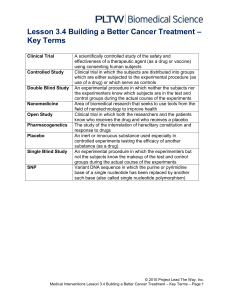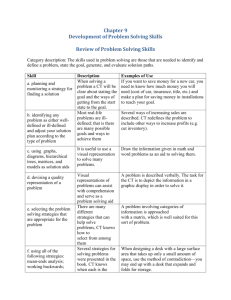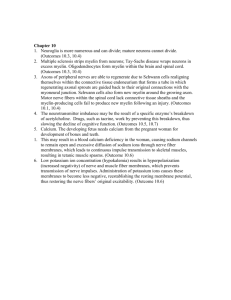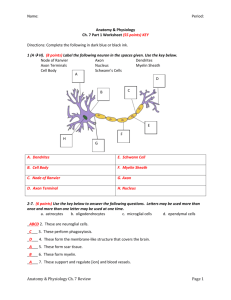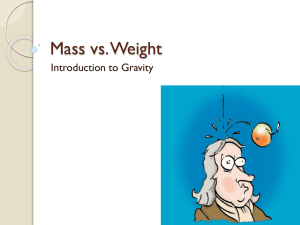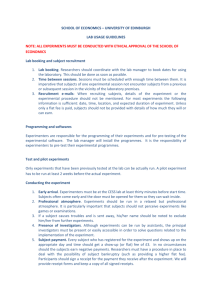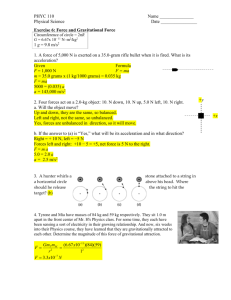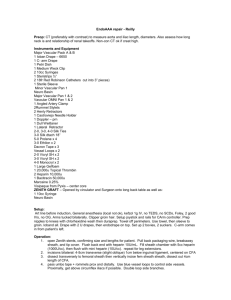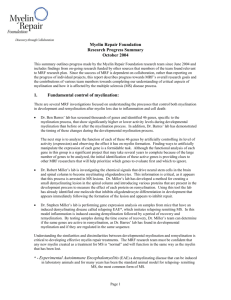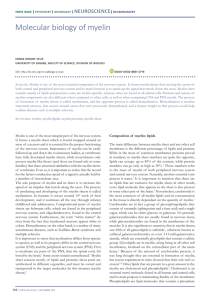Essay #2: Relating Terms
advertisement
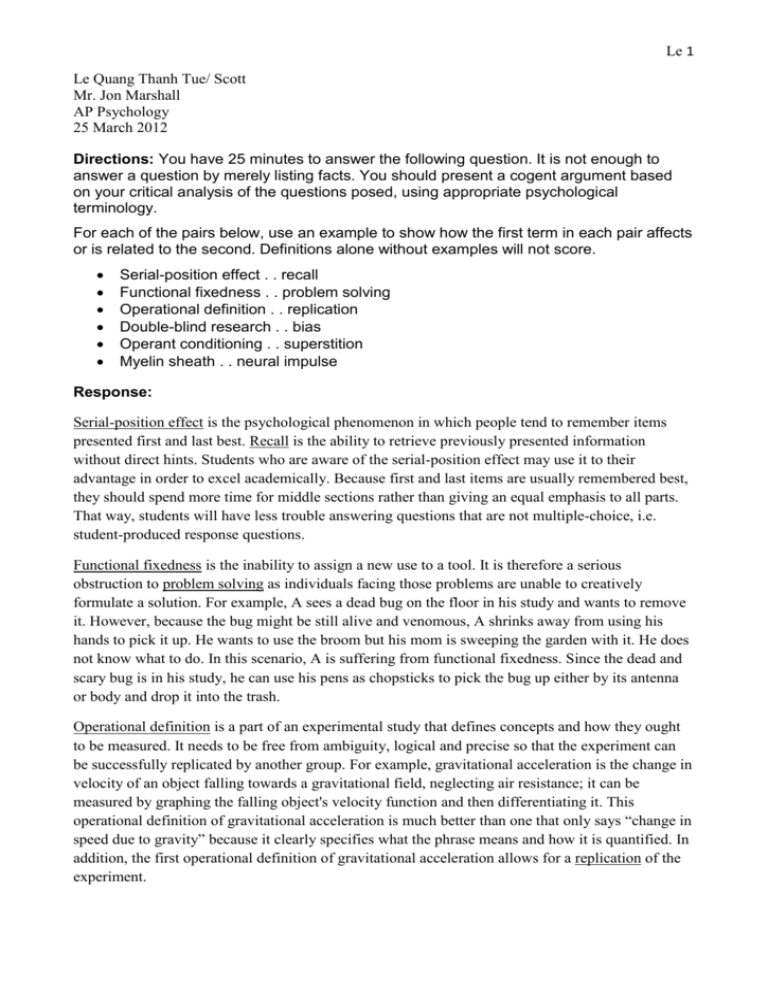
Le 1 Le Quang Thanh Tue/ Scott Mr. Jon Marshall AP Psychology 25 March 2012 Directions: You have 25 minutes to answer the following question. It is not enough to answer a question by merely listing facts. You should present a cogent argument based on your critical analysis of the questions posed, using appropriate psychological terminology. For each of the pairs below, use an example to show how the first term in each pair affects or is related to the second. Definitions alone without examples will not score. Serial-position effect . . recall Functional fixedness . . problem solving Operational definition . . replication Double-blind research . . bias Operant conditioning . . superstition Myelin sheath . . neural impulse Response: Serial-position effect is the psychological phenomenon in which people tend to remember items presented first and last best. Recall is the ability to retrieve previously presented information without direct hints. Students who are aware of the serial-position effect may use it to their advantage in order to excel academically. Because first and last items are usually remembered best, they should spend more time for middle sections rather than giving an equal emphasis to all parts. That way, students will have less trouble answering questions that are not multiple-choice, i.e. student-produced response questions. Functional fixedness is the inability to assign a new use to a tool. It is therefore a serious obstruction to problem solving as individuals facing those problems are unable to creatively formulate a solution. For example, A sees a dead bug on the floor in his study and wants to remove it. However, because the bug might be still alive and venomous, A shrinks away from using his hands to pick it up. He wants to use the broom but his mom is sweeping the garden with it. He does not know what to do. In this scenario, A is suffering from functional fixedness. Since the dead and scary bug is in his study, he can use his pens as chopsticks to pick the bug up either by its antenna or body and drop it into the trash. Operational definition is a part of an experimental study that defines concepts and how they ought to be measured. It needs to be free from ambiguity, logical and precise so that the experiment can be successfully replicated by another group. For example, gravitational acceleration is the change in velocity of an object falling towards a gravitational field, neglecting air resistance; it can be measured by graphing the falling object's velocity function and then differentiating it. This operational definition of gravitational acceleration is much better than one that only says “change in speed due to gravity” because it clearly specifies what the phrase means and how it is quantified. In addition, the first operational definition of gravitational acceleration allows for a replication of the experiment. Le 2 Double-blind research is an experimental method in which both the experimenters and the subjects are not aware of who belongs to the control group and tests are distributed randomly. This method was conceived in order to avoid experimental bias. Since neither the experimenters nor the subjects know what groups the subjects are in and what independent variable is being tested, it is less likely that the experimenters commit expectancy bias or inadvertently hinting the subjects what they think the results should be. For example, when a drug is tested for its effectiveness, a double-blind study can be administered on a group of volunteers randomly assigned to the control and experimental groups. The control group will receive a placebo whereas the experimental group will receive the actual drug. Because neither the experimenters nor the subjects know which group is being tested, chances that the results are slanted by expectancy bias are small. Operant conditioning is a form of learning in which behavior is altered by its consequences. It can be used to shape a subject’s behavior or train it to do something new by correctly and consistently issuing reinforcements and punishments. For example, operant conditioning can be applied to steer an individual away from superstition – the belief that supernatural forces determine our fates. Suppose B is a superstitious individual who thinks that Friday the 13th is an unlucky day. Her teacher may prompt her to think otherwise by encouraging her to excel in class on that particular day. He can let her actively participate in a sport and win, for instance. If her scores on that day turn out to be good, her disbelief in superstition will be weakened. In this case, encouragement, attention and good scores are positive reinforcements. Myelin sheath is an insulating layer around the axon that helps it conduct electrical impulses more easily. An electrical wire serves as an excellent analogy. The wire itself, made of copper, can be associated with the axon and the myelin sheath the insulating layer. If the insulating layer was absent, electrical potential may leak from the wire into the air. As a result, the voltage at the endpoint would be weakened. Almost the same thing occurs when a neural impulse moves through the axon: the Myelin sheath conserves the electrical potential of the impulse by preventing it from leaking out into the environs.
